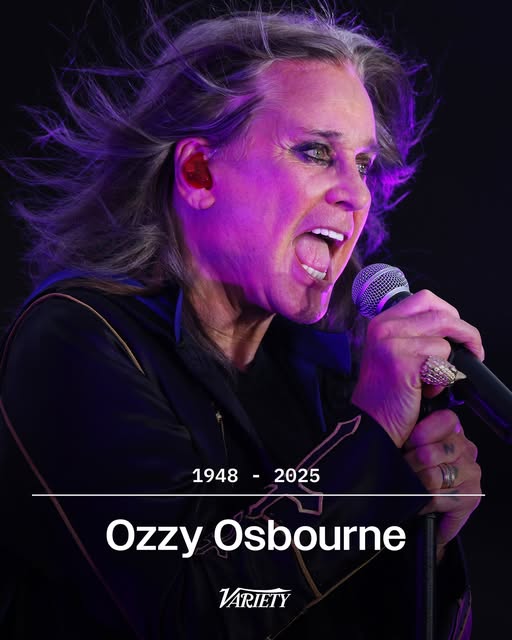
The Prince of Darkness has taken his final bow.
Ozzy Osbourne, the man who helped invent heavy metal, redefined rock stardom, and later became an unlikely reality TV legend, has died at the age of 76, following a prolonged battle with Parkinson’s disease.
The news was confirmed Tuesday morning by his family. The world now mourns not just the death of a man, but the end of an era.
“Ozzy was everything to us. A husband, a father, a friend, and a force like no other,” read a statement from wife Sharon Osbourne. “He changed the face of music. And he changed our lives.”
Born John Michael Osbourne in Aston, Birmingham, on December 3, 1948, Ozzy rose from poverty to global superstardom by doing what no one else dared: turning darkness into art, noise into beauty, and pain into power.
A Godfather of Metal
Ozzy’s legacy begins with Black Sabbath, the band he co-founded in 1969 with guitarist Tony Iommi, bassist Geezer Butler, and drummer Bill Ward. Their sound—heavy, sinister, and uncompromising—gave birth to the heavy metal genre.
With his haunting voice and stage presence that felt both menacing and magnetic, Ozzy helped take rock music into uncharted territory. Their 1970 debut album Black Sabbath set the tone, but it was Paranoid that exploded like a sonic bomb, delivering tracks like “Iron Man,” “War Pigs,” and “Paranoid”—songs still chanted by fans half a century later.
Critics scoffed. Parents panicked. Fans worshipped. And metal was born.
The Wild Ride of a Solo Legend
Ozzy’s career hit a detour in 1979 when he was fired from Black Sabbath, largely due to a toxic mix of drugs, alcohol, and infighting.
But what was supposed to be the end turned out to be just the beginning.
In 1980, with the release of Blizzard of Ozz, featuring guitarist Randy Rhoads, Ozzy launched a solo career that would eclipse even his Sabbath fame. “Crazy Train,” “Mr. Crowley,” and “Suicide Solution” turned Ozzy from fallen frontman to certified solo legend.
His live shows were infamous—part theater, part madness. He bit the head off a bat. He was banned from entire cities. He staggered, screamed, stumbled—and somehow stayed standing.
Through all the chaos, the music never stopped. Across 13 solo studio albums, Ozzy delivered ballads, bangers, and battle cries. Each album marked a chapter in his survival story.
A New Millennium, A New Ozzy
In the 2000s, a new generation fell in love with Ozzy for a very different reason: reality TV.
MTV’s The Osbournes, which premiered in 2002, followed Ozzy, his wife Sharon, and their children Jack and Kelly as they navigated the chaos of family life inside their Beverly Hills mansion. Ozzy was no longer the dark prince—he was the bumbling, hilarious, lovable rock dad who struggled with the TV remote and argued with his dogs.
It was raw, weirdly wholesome, and completely unfiltered. The show became a cultural phenomenon and earned Ozzy an Emmy. In a time before Instagram influencers and TikTok stars, Ozzy Osbourne was reality TV royalty.
Battles With the Body
Behind the scenes, the darkness returned.
Ozzy had battled addiction his entire life, but the 2010s and 2020s brought a different kind of fight: his own body.
After a serious fall in 2019 and multiple surgeries, Ozzy revealed in 2020 that he had been diagnosed with Parkinson’s disease, a progressive neurological disorder.
He tried to fight it. He still recorded music—Ordinary Man (2020) and Patient Number 9 (2022) were hailed as late-career triumphs. He collaborated with legends like Elton John, Eric Clapton, and longtime friend Tony Iommi. His lyrics reflected mortality, memory, and the fire that still burned inside.
But touring became impossible. His public appearances grew rarer. In 2023, he canceled what was meant to be his final tour. “I never imagined my touring days would end this way,” he said at the time. “But I thank you all for giving me a life I never deserved.”
Tributes Pour In
The world is now flooded with grief, remembrance, and love.
Metallica’s James Hetfield posted, “Without Ozzy, there’s no us. He taught us all how to be loud, real, and fearless.”
Billy Idol wrote, “He was the last of the true originals. A voice of thunder. A heart of gold.”
Even the Royal Family acknowledged the loss. A statement from King Charles read, “Ozzy Osbourne’s influence transcended music. He was a true icon of British culture.”
Fans worldwide held impromptu vigils in cities like London, Los Angeles, São Paulo, and Tokyo. Black Sabbath’s star on the Hollywood Walk of Fame is now buried beneath flowers, candles, and homemade signs reading “Thank you, Ozzy.”
Legacy Set in Stone
Ozzy Osbourne sold over 100 million records, won Grammy Awards, entered the Rock and Roll Hall of Fame, and created a musical blueprint followed by thousands of bands and millions of fans.
But numbers only tell half the story.
He gave voice to the outsiders, to the broken, to the wild-hearted. He taught generations that you could fall and still rise. That darkness could be beautiful. That chaos could be art.
He wasn’t just a rockstar. He was a myth. And now, he belongs to eternity.
The Final Word
In 2017, during the final Black Sabbath concert in Birmingham, Ozzy stood before a sea of fans, soaked in sweat, emotion, and history. After the last note of “Paranoid,” he looked out at the crowd and screamed:
“I fucking love you!”
That was Ozzy Osbourne. Raw. Honest. Loud. Loving.
Today, the world echoes that message back.
We fucking love you too, Ozzy.
Rest in power.
Rest in peace.
And ride that Crazy Train into the stars.

Leave a Reply